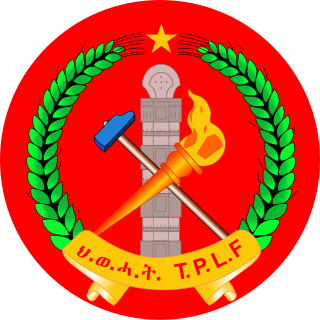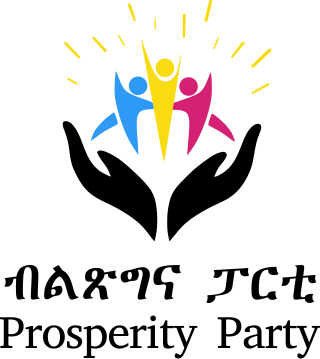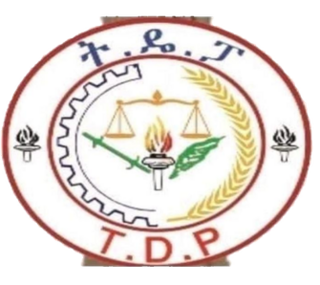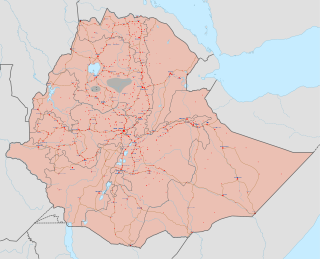
The politics of Ethiopia are the activities associated with the governance of Ethiopia. The government is structured as a federal parliamentary republic with both a President and Prime Minister. The legislature is multicameral, with a house of representatives and a council. The term politics of Ethiopia mainly relates to the political activities in Ethiopia after the late 20th century when democratization took place in the nation. The current political structure of Ethiopia was formed after the Tigrayan People's Liberation Front (TPLF) overthrew dictator President Mengistu Haile Mariam in 1991. A general election was held in June 1994 and Ethiopia has maintained a multiparty political environment until today.

The Tigray People's Liberation Front, also known as the Tigrayan People's Liberation Front, is a left-wing ethnic nationalist, paramilitary group, and the former ruling party of Ethiopia. It was classified as a terrorist organization by the Ethiopian government during the Tigray War until its removal from the list in 2023. In older and less formal texts and speech it is known as Woyane or Weyané.

The Oromo Federalist Democratic Movement Oromo: Warraaqsa Federaalistii Uummata Oromoo, OFDM) was a political party in Ethiopia, created in 2005 by Bulcha Demeksa to further the interests of the Oromo people as an alternative to the armed Oromo Liberation Front. In the 15 May 2005 federal election, the party won 11 seats, all from the Oromia Region. In March 2006, the party Whip was Mesfin Nemera Deriesa from the West Wallaga Zone. The OFDM merged with the Oromo People's Congress (OPC), forming the Oromo Federalist Congress (OFC), in 2012.

Medrek, officially the Ethiopia Federal Democratic Unity Forum, is an Ethiopian political coalition founded in 2008 by former defense minister Siye Abraha and former president Negasso Gidada. The election symbol of the party is five fingers. On 2008 election, Medrek won a single seat in the House of Peoples' Representatives, representing an electoral district in Addis Ababa. This was allegedly due to lack of election transparency. Medrek won 30% of the individual vote nationwide but received only one seat in parliament since Ethiopia's elections are conducted under a single-member plurality voting system.

Abiy Ahmed Ali is an Ethiopian politician who is the current Prime Minister of Ethiopia since 2018 and the leader of the Prosperity Party since 2019. He was awarded the 2019 Nobel Peace Prize "for his efforts to achieve peace and international cooperation, and in particular for his decisive initiative to resolve the border conflict with neighbouring Eritrea". Abiy served as the third chairman of the Ethiopian People's Revolutionary Democratic Front (EPRDF) that governed Ethiopia for 28 years and the first person of Oromo descent to hold that position. Abiy is a member of the Ethiopian parliament, and was a member of the Oromo Democratic Party (ODP), one of the then four coalition parties of the EPRDF, until its rule ceased in 2019 and he formed his own party, the Prosperity Party.

The 2021 Ethiopian general election to elect members of the House of Peoples' Representatives was held on 21 June 2021 and 30 September 2021. Regional elections were also held on those dates.

The Prosperity Party is a ruling political party in Ethiopia that was established on 1 December 2019 as a successor to the Ethiopian People's Revolutionary Democratic Front by incumbent Prime Minister Abiy Ahmed.
The Transitional Government of Tigray was a caretaker administration that was formally declared by the House of Federation of Ethiopia on 7 November 2020, in the context of a conflict between the Tigray People's Liberation Front (TPLF), in power in the Tigray Regional State and the federal government of Ethiopia. In late November 2020, the administration, headed by Mulu Nega, planned public consultation and participation in choosing new leaders at the regional and zonal level and preservation of woreda and kebele administrations. The Transitional Government left Tigray in late June 2021 during Operation Alula.

The Coalition of Ethiopian Federalist Forces was a coalition of Ethiopian political parties from 2019 to 2020 that included the Tigray People's Liberation Front (TPLF), the former ruling party that lost power in 2018.
Arena Tigray or Arena Tigray For Democracy and Sovereignty is an Ethiopian political party based in the Tigray Region and participating in the Medrek coalition federally.

The Assimba Democratic Party is an opposition party in the Tigray Region of Ethiopia.

The Tigray Democratic Party is an opposition party in the Tigray Region of Ethiopia.

The Benishangul-Gumuz conflict was an armed conflict mostly in the Metekel Zone of the Benishangul-Gumuz Region in Ethiopia that started in 2019, until peace agreement signed between the rebel groups and the government of Ethiopia in October 2022.

The Oromo Federalist Congress (OFC) (Oromo: Koongiresii Federalawaa Oromoo, KFO; is a political party based in Ethiopia that was created in 2012 from the merger of the Oromo Federalist Democratic Movement and Oromo People's Congress.

Salsay Weyane Tigray is a political party in the Tigray Region of Ethiopia.

The ongoing Ethiopian civil conflict began with the 2018 dissolution of the Ethiopian People's Revolutionary Democratic Front (ERPDF), an ethnic federalist, dominant party political coalition. After the 20-year border conflict between Ethiopia and Eritrea, a decade of internal tensions, two years of protests, and a state of emergency, Hailemariam Desalegn resigned on 15 February 2018 as prime minister and EPRDF chairman, and there were hopes of peace under his successor Abiy Ahmed. However, war broke out in the Tigray Region, with resurgent regional and ethnic factional attacks throughout Ethiopia. The civil wars caused substantial human rights violations, war crimes, and extrajudicial killings.
The Kimant Democratic Party or KDP is a political party of the Qemant people in Ethiopia.

Since the 1990s, the Amhara people of Ethiopia have been subject to ethnic violence, including massacres by Tigrayan, Oromo and Gumuz ethnic groups among others, which some have characterized as a genocide. Large-scale killings and grave human rights violations followed the implementation of the ethnic-federalist system in the country. In most of the cases, the mass murders were silent with perpetrators from various ethno-militant groups—from TPLF/TDF, OLF–OLA, and Gumuz armed groups.
The 1995 Ethiopian Federal Constitution formalizes an ethnic federalism law aimed at undermining long-standing ethnic imperial rule, reducing ethnic tensions, promoting regional autonomy, and upholding unqualified rights to self-determination and secession in a state with more than 80 different ethnic groups. But the constitution is divisive, both among Ethiopian nationalists who believe it undermines centralized authority and fuels interethnic conflict, and among ethnic federalists who fear that the development of its vague components could lead to authoritarian centralization or even the maintenance of minority ethnic hegemony. Parliamentary elections since 1995 have taken place every five years since enactment. All but one of these have resulted in government by members of the Ethiopian People's Revolutionary Democratic Front (EPRDF) political coalition, under three prime ministers. The EPRDF was under the effective control of the Tigray People's Liberation Front (TPLF), which represents a small ethnic minority. In 2019 the EPRDF, under Abiy, was dissolved and he inaugurated the pan-ethnic Prosperity Party which won the 2021 Ethiopian Election, returning him as prime minister. But both political entities were different kinds of responses to the ongoing tension between constitutional ethnic federalism and the Ethiopian state's authority. Over the same period, and all administrations, a range of major conflicts with ethnic roots have occurred or continued, and the press and availability of information have been controlled. There has also been dramatic economic growth and liberalization, which has itself been attributed to, and used to justify, authoritarian state policy.
Democratic backsliding in Ethiopia is ongoing, most notably under the administration of Prime Minister Abiy Ahmed. Since assumption of power in April 2018, Ahmed has played crucial role of reforms in the Ethiopian politics and reversal of policies implemented by the former ruling party, the Ethiopian People's Revolutionary Democratic Front (EPRDF). Abiy immediately gained public approval and international recognition owing to liberalized policymaking including in media outlets, gender equality, internet freedom and privatization of economy. Furtherly, he was also warmly gained accolades for ending 20-years conflict between Ethiopia and Eritrea, from which he awarded the 2019 Nobel Peace Prize, being the first Ethiopian to earn the title. In 2019, Ethiopia received a score of 19 out of 100 in the Freedom in the World metric, a significant improvement from previous years, although it is still characterized as "Not Free". In December 2019, he formed the Prosperity Party by dissolution of EPRDF and merged all its ethnic based regional parties while the Tigray People's Liberation Front (TPLF) refused to obey, resulting intense face-off with the federal government. He promised to hold free and fair upcoming election; although due to COVID-19 pandemic deterioration and other security and logistics issues, the election was postponed indefinitely in mid-2020. Opponents called this action as backdrop to "reconsolidate dictatorship" and "constitutional crisis". On 9 September 2020, the Tigray Regional election were held as the federal government deemed illegal election. According to the electoral commission, the TPLF won 98.2% of 152 seats were contested. The federal government and the Tigray authority relations aggravated by late 2020, culminating the Tigray War.














